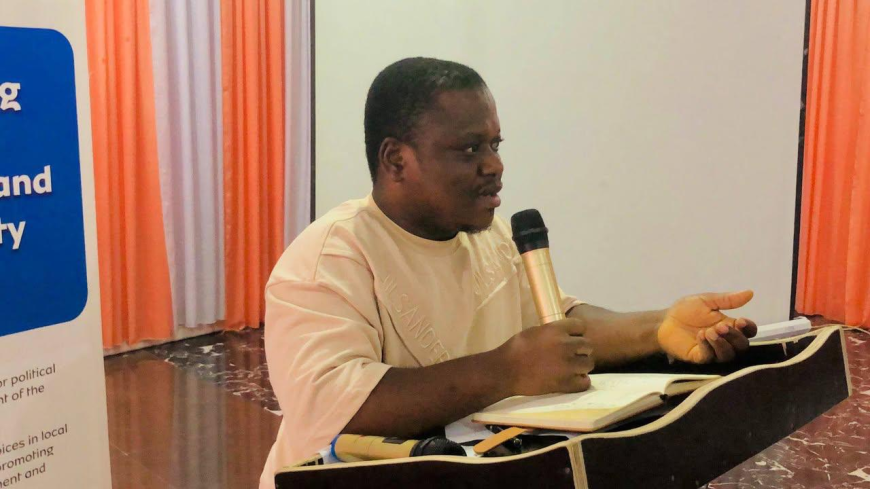Civil Society Organizations Detest Lawmakers' Attempt to Amend the 2018 Local Government Act

Monrovia, Liberia: Several civil society organizations in Liberia have voiced strong opposition to a draft bill currently before the House of Representatives that seeks to amend key provisions of the Local Government Act (LGA) of 2018.
The groups say the proposed changes could roll back progress in decentralization and weaken community participation in local development.
At a joint press conference held in Monrovia on Tuesday, June 24, 2025, Naymote Partners for Democratic Development, the Center for Transparency and Accountability in Liberia (CENTAL), the Women’s NGO Secretariat of Liberia (WONGOSOL), and the Center for Democratic Governance (CDG), described the attempt a threat to the democratic role of county councils, which were established to ensure that citizens—especially women, youth, and people with disabilities—have a voice in county-level decisions.
“We believe this bill undermines the very purpose of the Local Government Act,” CENTAL Executive Director Anderson D. Miamen said. “It risks taking power away from ordinary people and placing it back into the hands of a few,” he added.
The bill, introduced by Representative Jeremiah Sokan of Grand Gedeh County District #1, seeks to amend Sections 2.2 E and F of the Local Government Act. If passed, the bill would remove county councils’ authority to approve local budgets and development plans—powers that would instead shift to county legislative caucuses.
Supporters of the bill argue that these sections interfere with the Legislature’s oversight responsibilities.
But the CSOs say the proposed changes would create more problems than they solve.
“There’s no evidence that legislative caucuses are better suited to manage county development,” Miamen said. “Experience has shown the opposite.”
Concerns over Return to Centralized Control
The Local Government Act was enacted in 2018 to reduce the centralization of power in Monrovia and bring decision-making closer to communities.
The Act established county councils as representative bodies that include members of civil society, women, youth, traditional leaders, and other local groups.
Miamen said these councils are vital to promoting transparency, accountability, and inclusion, particularly for historically marginalized groups.
“These councils are one of the few formal spaces where women and people with disabilities can directly shape the future of their communities,” he added.
The civil society coalition pointed to Liberia’s experience with the County Social Development Fund (CSDF), where legislative caucuses had control over project selection and funds. That system, they noted, was widely criticized for corruption, poor oversight, and politically motivated spending.
Focus on Implementation, Not Rollback
While the CSOs acknowledged that some county council members may lack technical expertise, they emphasized that the solution lies in capacity building, not in removing their powers.
The LGA already makes provisions for administrative and legal support staff for county councils, but these roles have yet to be fully staffed by the government.
“We cannot judge the effectiveness of county councils when we haven’t even given them the tools to succeed,” Miamen said.
The groups also warned that shifting budget approval authority to lawmakers would limit genuine public participation, widen the gap between communities and decision makers, and undermine the spirit of decentralization.
Gender Inclusion at Risk
The groups raised particular concern about the bill’s impact on women’s participation in governance. Under the LGA, the presence of women in county councils is guaranteed through stakeholder group representation, a structure that WONGOSOL says must be preserved.
“Rolling back the powers of county councils would mean rolling back hard-won progress on gender equity,” the group said in a joint statement. “Women often understand the priorities of their communities, especially in areas like education, health, and social protection, and their voices must be part of the decision-making process.”
A Call for Legislative Responsibility
The coalition has also called on the Legislature to fulfill its responsibilities under the existing Local Government Act. Nearly two years after county councils were formally established, the Legislature has yet to set honorarium ceilings for council members or assign key civil service personnel to support them.
They stressed that decentralization cannot work in practice without the necessary political commitment and resources.
Final Appeal: Let the Law Work
In their closing message, the organizations urged the Legislature to withdraw the proposed amendment and instead focus on fully implementing the Local Government Act as it stands.
“Anything to the contrary,” Miamen warned, “will render the Act meaningless and reverse the gains we’ve made in inclusive governance.”
The CSOs say this moment presents a test of Liberia’s commitment to decentralization, citizen empowerment, and the inclusion of women and marginalized groups at all levels of government.
“Decentralization is not just about better service delivery, it’s about giving every Liberian a stake in development initiatives,” the coalition said. “We call on all stakeholders, government, partners, and citizens, to stand behind this vision and let the Local Government Act work.”
What's Your Reaction?









































































